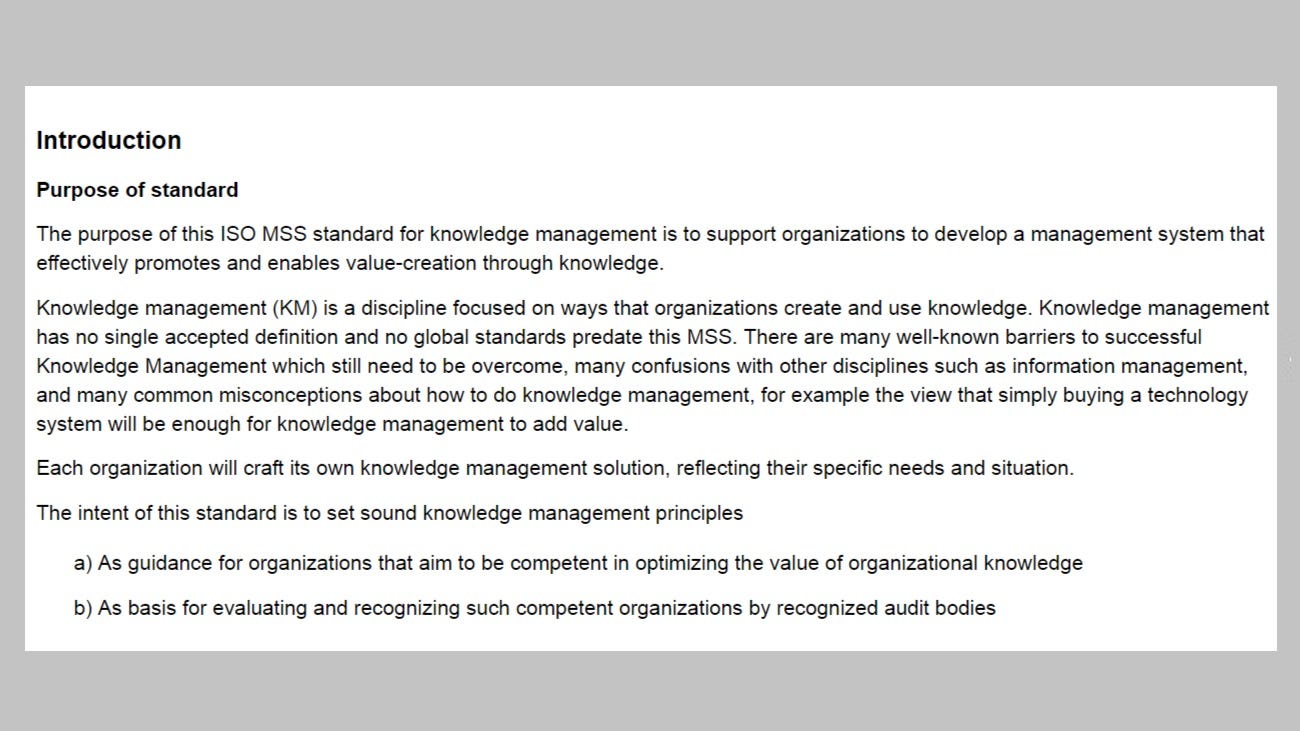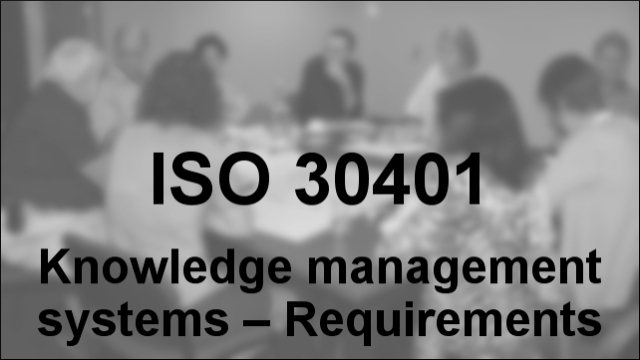Knowledge Management Iso Standard Iso 30401
- Iso Knowledge management systems - Requirements This document sets requirements and provides guidelines for establishing, implementing, maintaining, reviewing and improving an effective management system for knowledge management in organizations.
- This document sets requirements and provides guidelines for establishing, implementing, maintaining, reviewing and improving an effective management system for knowledge management in organizations. All the requirements of this document are applicable to any organization, regardless of its type or size, or the products and services it provides.
Introducing BS ISO 30401 – the new international knowledge management standard Knowledge can be an incredibly valuable commodity – but to make the most of it, organizations need the capacity to unlock and harness its power.
Favourite
Knowledge management (KM) has been around as a discipline and organisational practice since the 1990s, but is still smothered in confusion. Confusion about what it is, confusion with information management and confusion over what it means in practice.
The publication of BS ISO 30401: Knowledge management systems has the potential to end this confusion. For the first time, we have an internationally agreed standard that explains what KM is and how to approach it.
First things first
The standard is a management systems standard (MSS), written to the same template as other management systems standards – including the ISO 9001 Quality management systems standard. ‘Systems’ in the title refers to management systems: frameworks of objectives with policies (ISO-speak for strategiesWorld in conflict soviet assault mods 3. ) and processes to meet those objectives. ‘Systems’ has nothing to do with IT.
The standard defines knowledge as a human or organisational asset enabling effective decisions and action in context. Note the word ‘human’. Knowledge is created by people. It includes experience, know-how and insights. It can be individual, collective or organisational. Knowledge can be codified into documents – but it can never be captured completely. Note the word ‘context’. Every organisation has different knowledge and KM needs. KM is concerned with the way people and organisations create and use knowledge to create value – by making a difference to things that matter, such as goals and performance.
It follows that organisations need to produce their own KM objectives, policies and processes. The standard does not do this for you: it explains how to go about doing it for yourself, in your context, to meet your own organisational needs.
Like ISO 9001, the KM standard includes requirements: high-level dos and don’ts against which an organisation can be audited. In theory, organisations can undergo an external audit to seek certification to the standard. This is not the only way the standard can be used, though. It can be used as a business improvement tool, as a guide to getting started or improving existing KM, or for internal audit to check whether an organisation has the basic KM building blocks in place. In any case, there are no accredited external auditors yet!
The standard is written for organisations of all sizes, in all sectors and regardless of the products or services organisations provide. It applies to project work and to business as usual.
Contents of the standard
Because the standard is written to the ISO MSS template, its structure will be familiar to users of ISO 9001 and other MSS standards. It includes terms and definitions, and sections on the context of the organisation, leadership, planning, support, operation, performance evaluation and improvement.
The introduction sets out the principles of KM, including (in my own words):
- Knowledge is intangible, complex and created by people
- KM unlocks the potential value of knowledge by making sure it has a positive impact on things that matter to organisations
- There is no one-size-fits-all-organisations KM solution
- KM includes interactions between people to build shared understanding
- Knowledge is not managed directly: KM focuses on the working environment to nurture the creation and use of knowledge
- Culture is a critical aspect of the working environment
The section about the context of the organisation includes:
- Knowledge development activities that should be covered by KM: a kind of knowledge lifecycle of acquiring new knowledge, applying current knowledge, retaining current knowledge and handling outdated knowledge.
- Knowledge conveyance and transformation: ways in which knowledge is created and shared through human interaction, representation (such as leading by example or writing things down), combination (such as curation and synthesis of knowledge), and internalisation and learning (to put knowledge into practice).
- Knowledge management enablers: human capital, KM processes, technology, governance and culture.
Three annexes provide guidance on:
- The range of knowledge and KM
- Relationships between KM and other disciplines (including information management)
- KM culture
Help shape the future
As a member of the working group that developed the KM standard, I have little influence over how it will be used. That’s up to you. How might you use the standard? Do you think you will use it? Has this blog post attracted your interest in KM? Are you surprised by the scope or messages in the standard? Please share your thoughts in the comments.
Knowledge Management Standard Iso 30401

My personal hope for the future is that publication of the standard marks the beginning of the end for KM confusion. At last we have a common language we can use to talk about KM – so let’s start talking.
The Knowledge SIG annual conference in November will include a presentation and workshop on the KM standard.
Following the international vote and approval of the new ISO Knowledge Management Systems Standard, ISO 30401 on February, we have met this week in Paris for three days of intensive discussions, reviewing 420 comments and change requests that were received from the many countries that took part in the vote.

The knowledge management systems standard sets the requirements needed to facilitate the development, sharing and effective use of knowledge in organizations as a means to achieve their objectives. With a broad, holistic and interdisciplinary view, it is intended to support organizations to develop a management system that effectively promotes and enables value-creation through knowledge. Of course, each organization will craft its own knowledge management solution, that is best suited to them, and choose an appropriate implementation method.
Because of the essence of knowledge management as a complex adaptive and constantly developing system, a con-texture that is embedded in the work processes and culture of the organization, the experts that take part in these discussions are repeatedly going over every word and every comment with the aim of reaching as comprehensive and clear guidelines as possible, while adhering to ISO standards and compliance with other international standards.
Adding KM to the existing body of management, quality and HR standards provides its long-required focus in international standardization, with proper integration, but it also requires to adhere to and reference other standards and to use the ISO language in which there is particular attention to every word and detail. As an example, there is a significant different between the use of the words 'shall' and 'should'. Discussions on the proper text to use may indeed take some time and very meticulous discussions.

The members of the international experts committee (ISO/TC 260/WG 6) that have traveled to Paris and gathered together are delving deep into the details of the new standard, the valuable comments and ideas that have been received worldwide and put them together with much improvements and refinement over the course of the meetings. Moria Levy coordinates and leads the work of the committee and the discussion. The committee members, experts from various countries who came and gathered in the room for in-depth discussion include Nick Milton, Judy Payne, Maik H. Wagner, David Lamotte, Jean-Louis Ermine, Ron Young, Randy McCamey, Dele Aloko, Mark Loon, and myself. Together we go through each paragraph and section, and continue the discussion on all the change suggestions received.